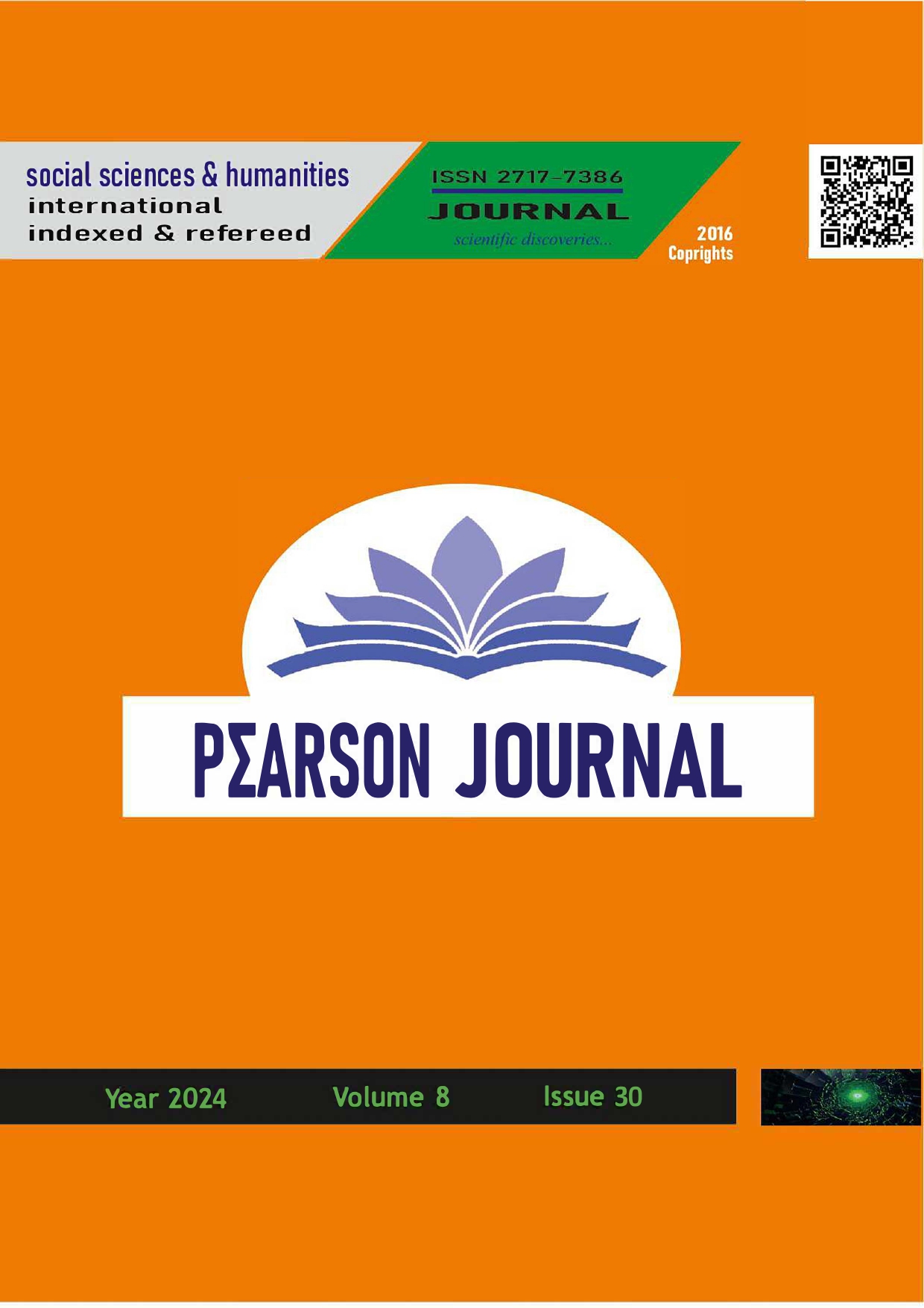Jean-Michel Basquiat ve Pop Kültüre Katkı: İkonografi ve Semboller
DOI:
https://doi.org/10.5281/zenodo.14359677Anahtar Kelimeler:
Jean- Michel Basquiat, Popüler Kültür, Sembolik Dil, İkonografiÖzet
Jean-Michel Basquiat, 1980'lerin New York sanatında yükselen, çağdaş sanatın sahne yönelimli ve popüler kültürün dönüştüğü bir figürdür. Afro-Amerikan kimliği, toplumsal adalet ve kültürel miras temalarının ürünlerini ustalıkla işleyen Basquiat, sanatını yalnızca bir ifade biçimi değil, aynı zamanda toplumsal eleştirinin bir aracı olarak kullanmıştır. Bu makale, sanatçının pop kültürünün üzerinde yer aldığı, çalışmalarında yer alan sembolik dili ve tekrarlayan imgeleri, ayrıca ikonografi ve sanatsal üslubunun çözümlemesini ele almaktadır. Basquiat'ın çalışmaları, yüksek sanat ile sokak sanatı arasındaki alanları genişletirken, popüler geniş dinamiklerle güçlü bir iletişim sağlamıştır. Taç, sayılar, çizgiler, metinler ve kafatası gibi semboller aracılığıyla kimlik, tarih ve toplumsal politikaları ele almış ve bu imgelerle çok katmanlı bir anlatı sunmuştur. Sanatçı, Andy Warhol gibi isimlerle yaptığı iş birlikleriyle pop genişliğinde sanat üzerindeki geniş kapsamlılığı derinleştirmiştir. Basquiat'ın sanatının evrensel temaları ve zamansız üslubu, günümüzde yeni nesil sanatçılara ilham uygulamalarına devam etmektedir. Onun eserleri, yalnızca geçmişin bir parçası değil, aynı zamanda geleceğin sanatına dair önemli ipuçları barındırmaktadır.
Anahtar Kelimeler: Jean- Michel Basquiat, Popüler Kültür, Sembolik Dil, İkonografi
Referanslar
KAYNAKÇA
Alesandrini, E. (2020). What artists and museum educators can teach us about combatting the opioid epidemic. The Ama Journal of Ethic, 22(8), 735-738. https://doi.org/10.1001/amajethics.2020.735
Burnham, S. (2010). The call and response of street art and the city. City, 14(1-2). 137-153. https://doi.org/10.1080/13604810903528862
Davis, L. E. (2018). The privatization of street art and the preservation paradox. Visual Inquiry, 7(1), 29-43. https://doi.org/10.1386/vi.7.1.29_1
Econopouly, B. F. and Jones, S. S. (2018). Jean-Michel Basquiat, Charles Darwin, T. H. Huxley, the origin of cotton and gregor mendel (inventor of x-rays). Leonardo, 51(3), 265-269. https://doi.org/10.1162/leon_a_01261
Emmerling, L. (2022). Basquiat. Köln: Taschen.
Forte, F. and Paola, P. D. (2019). How can street art have economic value?. Sustainability, 11(3), 580. 1-12. https://doi.org/10.3390/su11030580
Fretz, E. (2010). Jean-Michel Basquiat: a biography. (First Edition). Santa Barbara Greenwood Biographies. DOI: 10.5040/9798400674020
Garay, U., Pérez, E. O., Casanova, J., & Kratohvil, M. (2022). Color intensity, luminosity, contrast and art prices: the case of jean-michel basquiat. Academia Revista Latinoamericana De Administración, 35(3), 303-328. https://doi.org/10.1108/arla-05-2021-0110
Lucey, K. (2018). Celebrating african american children’s literature: an “eye of the beholder” workshop. Children and Libraries, 16(3), 7-9. https://doi.org/10.5860/cal.16.3.7
Mantiñán, M. J. P., Villa, F. R. D., & Rodríguez, R. L. (2020). Citizen action as a driving force of change. the meninas of canido, art in the street as an urban dynamizer. Sustainability, 12(2), 740. 1-22. https://doi.org/10.3390/su12020740
Mathew, P. M. (2019). Co‐option of graffiti and the persona of the artist in the neoliberal age. The Journal of Popular Culture, 52(5), 1141-1162. https://doi.org/10.1111/jpcu.12843
Morris, M (2018). Handbook of cultural studies and education. P. P. Trifonas and S. Jagger (Eds.), Jean-Michel Basquiat, graffiti artist. (pp. 458-469). New York: Routledge.
Myers, A. (2006). Basquiat, Jean-Michel. Oxford African American Studies Center. 2024,https://oxfordaasc.com/view/10.1093/acref/9780195301731.001.0001/acref-9780195301731-e-40196.
Oddy, E. O. (2020). 9-to-5, went to college, not 2-nite homey blues. Jazz Research Journal, 13(1-2), 19-32. https://doi.org/10.1558/jazz.37810
Ongiri, A. (2002). Downtown 81: a tribute to jean michel basquiat. Nka Journal of Contemporary African Art, 2002(16-17), 108-108. https://doi.org/10.1215/10757163-16-17-1-108
Pinn, A. (2013). “why can’t i be both?”. Journal of Africana Religions, 1(1), 109-132. https://doi.org/10.5325/jafrireli.1.1.0109
Rodrigues, L. (2010). “samo© as an escape clause”: Jean-Michel Basquiat’s engagement with a commodified american africanism.
Journal of American Studies, 45(2), 227-243. https://doi.org/10.1017/s0021875810001738
Rossini, A.(2024). “Boggy, soggy, squitchy Ppctures”: Adaptations of moby-dick in the art of Jean-Michel Basquiat. Journal of Narrative and Language Studies,12(25), 150-167. https://doi.org/10.59045/nalans.2024.4
Saggese, J. M. (2011). Cut and mix. Nka Journal of Contemporary African Art, 2011(28), 88-95. https://doi.org/10.1215/10757163-1266702
Steptoe, J. (2016). Radiant child: The story of young artist Jean-Michel Basquiat. New York: Little, Brown Books for Young Readers.
Thompson, R. F. and Richard, R. (2015). Jean Michel Basquiat (First Edition). New York: Rizzoli International Publications.
Ярцева, О. А. (2020). Jean-Michel Basquiat and the 1980s new york art scene. Искусство Евразии, 1(16), 335-343. https://doi.org/10.25712/astu.2518-7767.2020.01.025
İnternet Kaynakları
Untitled, 1982 Crown. (t.y.) Erişim adresi: https://www.jean-michel-basquiat.org/untitled-1982-crown/
Basquiat’s Crowns 1981-2. (t.y.) Erişim adresi: https://www.everypainterpaintshimself.com/article/basquiats_crowns
Jean-Michel Basquiat Hollywood Africans, t.y.) Erişim adresi: https://whitney.org/collection/works/453
Jean-Michel Basquiat Red Kings. (t.y.) Erişim adresi: https://www.sothebys.com/en/buy/auction/2024/contemporary-evening-auction-2/red-kings
Jean-Michel Basquiat Untıtled Charles Darwin. (t.y.). Erişim adresi:
https://www.flickr.com/photos/timevanson/33034391143/in/photostream/
Gravestone 1987 by Jean-Michel Basquiat. (t.y.). Erişim adresi: https://www.artchive.com/artwork/gravestone-jean-michel-basquiat-1987/
Untitled Jean-Michel Basquiat. (t.y.). Erişim adresi: https://www.thebroad.org/art/jean-michel-basquiat/untitled
İndir
Yayınlanmış
Nasıl Atıf Yapılır
Sayı
Bölüm
Lisans
Telif Hakkı (c) 2024 PEARSON JOURNAL

Bu çalışma Creative Commons Attribution 4.0 International License ile lisanslanmıştır.


